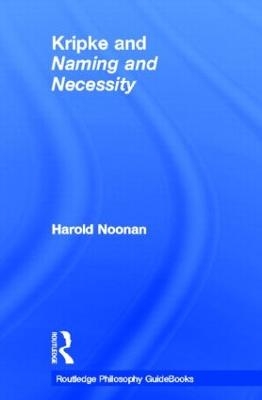
Routledge Philosophy GuideBook to Kripke and Naming and Necessity
Seiten
2012
Routledge (Verlag)
978-0-415-43621-2 (ISBN)
Routledge (Verlag)
978-0-415-43621-2 (ISBN)
Harold Noonan introduces and assesses Kripke's most famous work, Naming and Necessity, placing it in context and explaining its significant contribution to the philosophy of language, logic and metaphysics.
Saul Kripke is one of the most important philosophers of the twentieth century. His most celebrated work, Naming and Necessity, makes arguably the most important contribution to the philosophy of language and metaphysics in recent years. Asking fundamental questions – how do names refer to things in the world? Do objects have essential properties? What are natural kind terms and to what do they refer? – he challenges prevailing theories of language and conceptions of metaphysics, especially the descriptivist account of reference, which Kripke argues is found in Frege, Wittgenstein and Russell, and the anti-essentialist metaphysics of Quine.
In this invaluable guidebook to Kripke's classic work, Harold Noonan introduces and assesses:
Kripke's life and the background to his philosophy
the ideas and text of Naming and Necessity
the continuing importance of Kripke's work to the philosophy of language and metaphysics.
The Routledge Philosophy GuideBook to Kripke and Naming and Necessity is an ideal starting point for anyone coming Kripke's work for the first time. It is essential reading for philosophy students studying philosophy of language, metaphysics, logic, or the history of analytic philosophy.
Saul Kripke is one of the most important philosophers of the twentieth century. His most celebrated work, Naming and Necessity, makes arguably the most important contribution to the philosophy of language and metaphysics in recent years. Asking fundamental questions – how do names refer to things in the world? Do objects have essential properties? What are natural kind terms and to what do they refer? – he challenges prevailing theories of language and conceptions of metaphysics, especially the descriptivist account of reference, which Kripke argues is found in Frege, Wittgenstein and Russell, and the anti-essentialist metaphysics of Quine.
In this invaluable guidebook to Kripke's classic work, Harold Noonan introduces and assesses:
Kripke's life and the background to his philosophy
the ideas and text of Naming and Necessity
the continuing importance of Kripke's work to the philosophy of language and metaphysics.
The Routledge Philosophy GuideBook to Kripke and Naming and Necessity is an ideal starting point for anyone coming Kripke's work for the first time. It is essential reading for philosophy students studying philosophy of language, metaphysics, logic, or the history of analytic philosophy.
Harold Noonan is Professor of Philosophy at the University of Nottingham, UK. He is the author of Hume on Knowledge (1998), and Personal Identity (second edition 2003), both available from Routledge.
1.Introductory Overview 2. The Background 3. Naming 4. Necessity 5. Extensions. Index
| Erscheint lt. Verlag | 17.12.2012 |
|---|---|
| Reihe/Serie | Routledge Philosophy GuideBooks |
| Verlagsort | London |
| Sprache | englisch |
| Maße | 129 x 198 mm |
| Gewicht | 630 g |
| Themenwelt | Geisteswissenschaften ► Philosophie ► Erkenntnistheorie / Wissenschaftstheorie |
| Geisteswissenschaften ► Philosophie ► Logik | |
| Geisteswissenschaften ► Philosophie ► Metaphysik / Ontologie | |
| Geisteswissenschaften ► Philosophie ► Sprachphilosophie | |
| ISBN-10 | 0-415-43621-4 / 0415436214 |
| ISBN-13 | 978-0-415-43621-2 / 9780415436212 |
| Zustand | Neuware |
| Haben Sie eine Frage zum Produkt? |
Mehr entdecken
aus dem Bereich
aus dem Bereich
die Grundlegung der modernen Philosophie
Buch | Softcover (2023)
C.H.Beck (Verlag)
18,00 €
Buch | Softcover (2023)
Reclam, Philipp (Verlag)
7,00 €


![Was heißt Denken?. Vorlesung Wintersemester 1951/52. [Was bedeutet das alles?] - Martin Heidegger](/media/113619842)